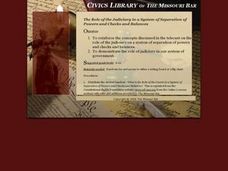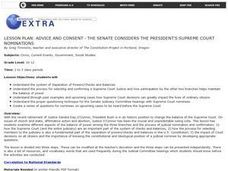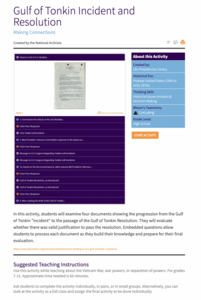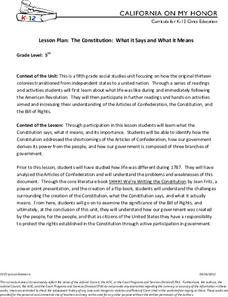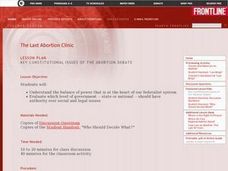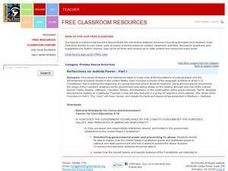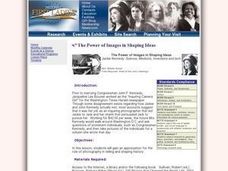Curated OER
Government Lesson Plan: Lesson 1
Students identify the powers of national and state governments. They evaluate the balance of national versus state power. They utilize worksheets imbedded in this plan to gain a deeper perspective of how the government powers are separated.
Judicial Learning Center
The Constitution
Supreme Court justices debate the meaning of the US Constitution, but we expect teachers to explain it to scholars with far less training and experience. A daunting task for sure, but it's not insurmountable with resources that simplify...
Judicial Learning Center
Article III and the Courts
What's the best way to make sense of the Constitution? A helpful lesson contains both the text of Article III and annotation of each of its sections, breaking it down into easy-to-understand parts. It also includes links to a glossary...
Curated OER
What is the Federal System Created by the Constitution?
Explore the unique structure of the federal system of government in the United States. Class members will learn about how most nations were organized before the establishment of the Constitution, how power is currently divided between...
Curated OER
The U.S. Constitution Power Grab Game
Students study the powers and limitations of the three branches of the American government. They explain how the system of "checks and balances" protects the individual citizens. They explain how the amendments to the Constitution...
Curated OER
Powers of Government
Students explore and identify the power of national and state governments. They discuss the concept of federalism and the distribution of governmental powers. As a class, they examine the balance of power between the federal and state...
Curated OER
Government: Missouri Bar Civics Library
Learners visit the Missouri bar Website to examine information about the U.S. Constitution and its Amendments. They complete a variety of activities from the provided lessons including the judiciary, Fourth Amendment issues, civil law,...
Curated OER
Advice And Consent - the Senate Considers the President's Supreme Court Nominations
Students study the process and questioning for selecting a Supreme Court Justice. They examine how the decisions of the Supreme Court effect the lives of citizens. They complete worksheets as they study the material.
Curated OER
Judicial Review
Pupils visit the Missouri Bar Civics Library to examine the process of judicial review. After completing a worksheet, they discuss the questions to determine what they learned, what more they would like to know, and how the information...
DocsTeach
Gulf of Tonkin Incident and Resolution
They sunk our battleship! An engaging activity focuses on the Gulf of Tonkin Incident and the sinking of the USS Maddox. Young historians learn how it increased tensions leading to the Vietnam War and read through a first draft of the...
Judicial Learning Center
Judicial Independence
Most people support the idea of an independent judiciary in theory until they hear about a court case that violates their principles. An informative resource explains why the concept is important. It also provides scholars of criminology...
Judicial Learning Center
About Federal Judges
Not just anybody can do the job of a federal judge, but according to the United States Constitution just about anybody can be appointed. The lesson outlines the process and requirements for becoming a federal judge, focusing on the...
Judicial Branch of California
The Constitution: What It Says and What It Means
Learners get the chance to act as representatives to the Constitution Convention, and must decide whether or not to recommend your state ratify the new framework. After examining the Constitution line-by-line, they consider their...
Constitutional Rights Foundation
What Is Constitutional Democracy?
Rediscover the values at the heart of American democracy and what makes it unique with your pupils. Use a reading and discussion questions—in addition to an analytical activity—on the preamble to the Constitution. An additional activity...
Cave Creek Unified School District
Crusades and Culture in the Middle Ages
The Crusades sounds like a glamorous time period in the Middle Ages full of glory—but was it? Scholars find and review the truth of the Crusades' influence on the world through the resource. The study guides, separated individually by...
Curated OER
Separation of Church and Class?
Students examine the changing socioeconomic status of the evangelical Christian population in the United States. They discuss the relationship between class and religion in American society.
Curated OER
Constitution Cartoons
Students view series of cartoon overheads that explain Constitution, name branches of government and their powers, define federalism and separation of powers, examine rights and obligations of citizens, and discuss significance of...
Curated OER
U.S. and Iroquois Governments
Eighth graders compare the roles and functions of the different branches of the Iroquois and US governments, and the the principles of separation of power.
Curated OER
The Last Abortion Clinic: Key Constitutional Issues of the Abortion Debate
Learners discuss the Constitution of the United States and its amendments, then apply this discussion by creating a "Who should Decide What?" list, based upon their ideas about whether controversial issues such as abortion and medical...
PBS
The Roosevelts: An Intimate History—Snapshot Lessons
The Roosevelt family was one of the most influential and prominent political forces in the 20th century, leaving behind a wide-ranging legacy of conservation, progressivism, and economic growth. Learn more about President Theodore...
Civil Rights Movement Veterans
Timeline of Events: 1960’s Civil Rights Movement of St. Augustine, Florida
A timeline can be a powerful learning tool because it reveals a pattern in events. While few would consider St. Augustine, Florida a hotbed of the 1960s Civil Rights Movement, a selection of background information and a timeline of...
Humanities Texas
Primary Source Worksheet: Lyndon B. Johnson, Excerpt from “The Great Society”
Young historians examine Lyndon Johnson's vision for a rich, powerful, and upward society as detailed in this excerpt from his famous "Great Society" speech presented at the University of Michigan in 1964.
Curated OER
Reflections on Judicial Power - Part I
Students research the Constitutional provision for the Judicial branch of government. They examine different U.S. founder's positions on the relative strength of the judicial branch and act as a review court for Marbury vs. Madison.
National First Ladies' Library
The Power of Images in Shaping Ideas
Learners examine the role of photography in recording and sharing history. They view online photos that Life magazine has identified as changing the world, then conduct research on one of the photos. Students create and present an oral...








